In this article:
Tension headaches or stress headaches induce a feeling of pressure and tightness across your head. Tension headaches produce mild to moderate pain and affect both genders. However, it rarely interrupts your daily activities.
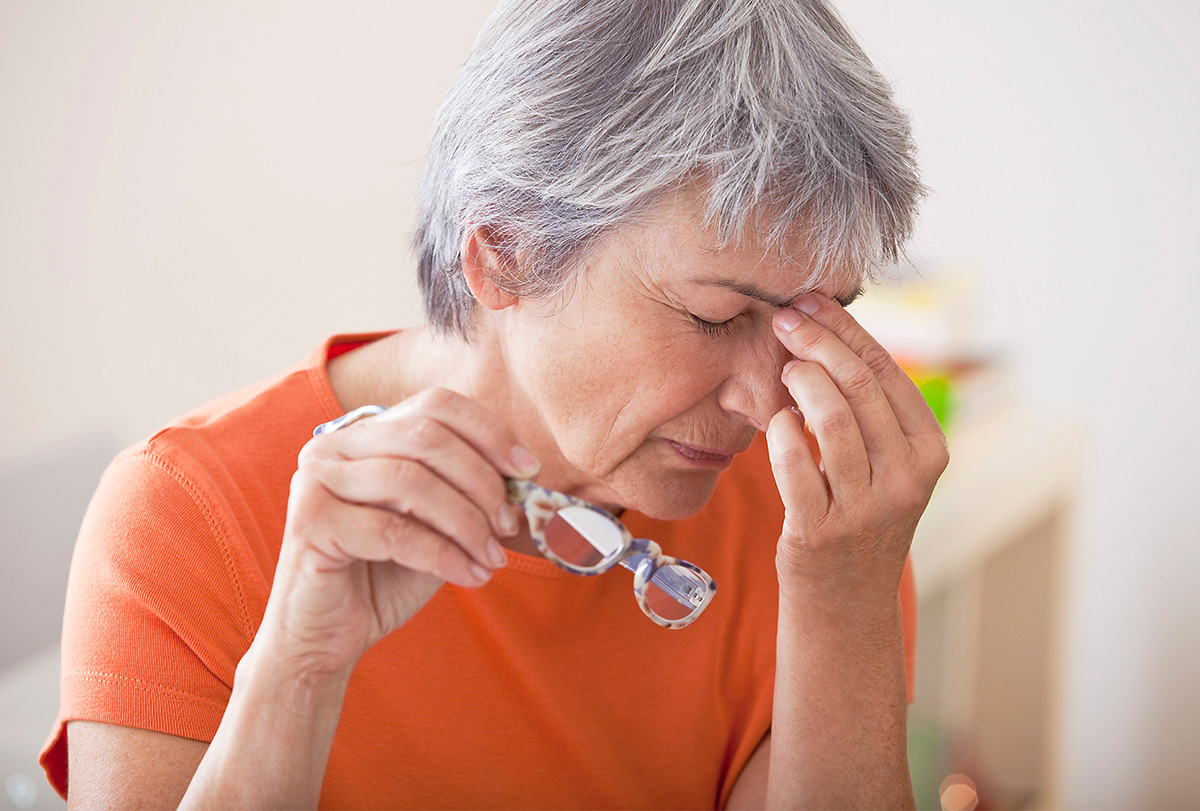
Home Remedies for Relieving Tension Headaches
Here are various home remedies that may help you manage tension headaches.
1. Apply a cold compress
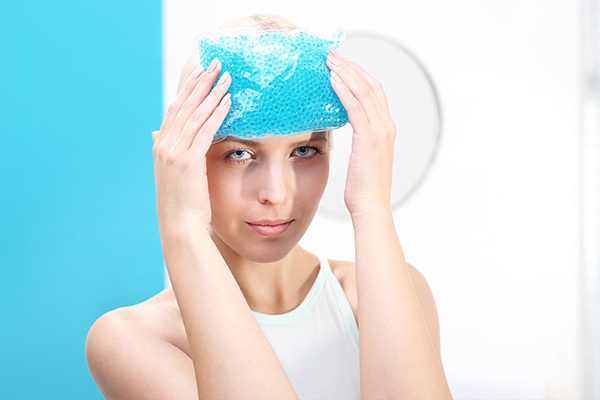
Applying an ice pack to your head can help relieve your headache by soothing the sore muscles responsible for it.
Cold therapy may work by constricting the swollen blood vessels associated with muscle tension and bringing down the pressure in your head, thereby relieving the pulsating ache. (1)
You can also take a cool shower to get some relief from the headache.
Caution: Never apply ice directly to your skin as it can lead to frostbite.
2. Take OTCs
Over-the-counter pain-relieving medications such as paracetamol, aspirin, ibuprofen, and naproxen can be used to relieve tension headaches. It is important to not use painkillers more than twice a week as it can increase the chances of chronic daily headache.
Consult your doctor before taking OTC medications. Avoid giving aspirin to children.
3. Use peppermint and lavender oil
Lavender oil helps you relax and provides a soothing effect. (2)(3)
Moreover, rubbing peppermint oil on your temples or head, neck, and shoulder muscles helps relieve tension headaches. (4)(5)(6) You can also sip on peppermint tea for the same.
Caution: It is vital to dilute essential oils before use as they can cause skin reactions. Avoid using essential oils on children and pregnant or breastfeeding women.
4. Consume riboflavin
Vitamin B2, or riboflavin, acts as an antioxidant that neutralizes the effect of free radicals therefore helping prevent tension headaches. (7)(8) Consume eggs, legumes, lean meats, green leafy vegetables, nuts, dairy products, and milk to increase your riboflavin intake.
5. Increase magnesium intake
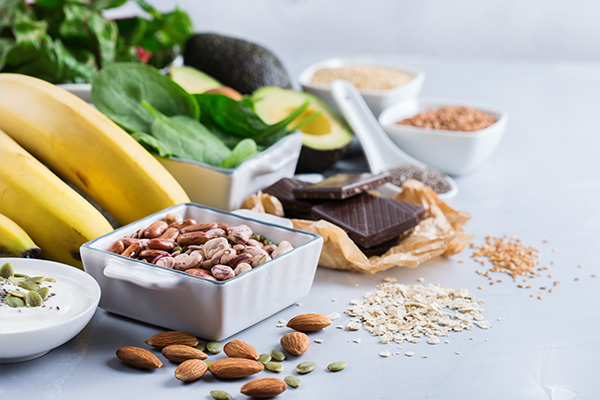
Magnesium is found to help in the treatment of migraine, tension headaches, and cluster headaches. (9)
Nuts, seeds, grains, and green vegetables can be included in the diet for their magnesium content. You can also take magnesium supplements. However, they can cause diarrhea and other adverse reactions. Therefore, always consult your doctor before taking supplements.
6. Consume tea
A very popular anecdotal remedy for relieving headaches is a warm cup of tea. Ginger tea and green tea with lemon/honey are commonly used, although their usage is not supported by any clinical research.
Alternative Therapies
Various therapies, when performed with the help of experts, can help manage tension headaches.
1. Consider acupressure
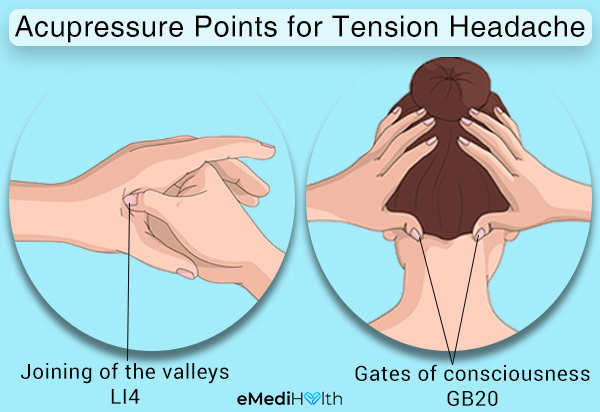
Acupressure involves stimulating specific pressure points on the body with the simple power of touch. In this treatment modality, physical pressure is applied to the acupoints to clear any blockage in the flow of your life energy.
It helps trigger your body’s innate healing response against a wide array of ailments and may help in alleviating headaches and neck pain. (10)
2. Try cognitive-behavioral therapy
Cognitive-behavioral therapy (CBT) is a type of talk therapy that can help you manage your stress. CBT gives you an insight into the possible causes of your stress and anxiety that lead to tension headaches. (11)
Standard practice involves multiple sessions with a mental health specialist who will speak to you on a one-on-one basis to unearth various mental blocks that may be keeping you from getting better.
This kind of psychological support therapy may help maximize and prolong the therapeutic effects of your treatment strategy in general. (12)
3. Use biofeedback
Biofeedback is a non-pharmacological technique that involves using electronic or electromechanical devices to record visual and auditory feedback from the body.
By keeping track of your tension levels and the resulting muscle strain you gradually learn to circumvent or mitigate tension headaches by keeping your tension under control and your muscles relaxed.
Various types of biofeedback techniques may help improve treatment outcomes when used in conjunction with prescribed headache medication, but there is a good chance that this treatment tool may not provide any significant relief. (13)
4. Submit to chiropractic care
Poor body posture can misalign your spine and exert great pressure on your muscles. The more tense your muscles are, the more likely you are to experience tension headaches. Chiropractic care involves an eclectic mix of lifestyle changes, physical manipulation, and massage therapy to correct your posture and relax the tense muscles.
Self-Care Measures
The following self-care measures and lifestyle changes can help prevent the occurrence of tension headaches.
1. Manage your stress
Controlling your stress levels not only reduces the frequency of a headache but also stops the pain from worsening.
Here are some of the things you can do to manage your stress:
- Fix yourself a therapeutic bath, and spend some quality time by yourself.
- Soft and soothing music can help calm your mind by temporarily blocking out the noise of the world.
- Recreational hobbies such as gardening or painting can offer you a much-needed respite from the constant drudgery of everyday life.
- Read inspirational texts to keep your spirits high.
- Venture outdoors for a nice relaxing walk every now and then, preferably in an area with abundant greenery so you can breathe in the fresh air.
- A number of restorative techniques, including deep breathing, yoga, meditation, guided imagery, visualization, and progressive muscle relaxation, can help you manage your stress levels better.
- Exercise works as an excellent stress buster and should be done regularly for the best results.
2. Practice mindfulness meditation
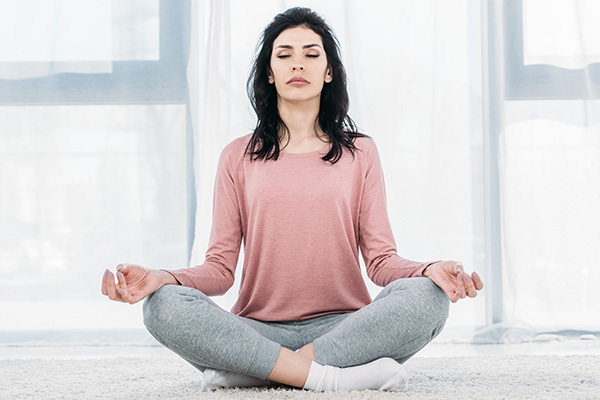
Mindfulness meditation helps in stress management and improves both your physical and mental health. The idea behind mindful meditation is to be attentive to your thoughts, emotions, and perceptions and accept them as they are.
Mindfulness-based stress reduction (MBSR) can help address the severity and frequency of tension headaches. (14)(15) However, to conclusively establish these effects, they have to be validated by more rigorous and large-scale studies. (16)
3. Get a massage
Massage, if done correctly, can help release the tension trapped in your muscles. Gently rubbing your head, neck, and back also stimulates blood flow to the area and further relieves your muscle soreness.
Also, it can decrease the duration, intensity, and frequency of a headache. (17)(18) When massaging, pay special attention to the temples and back of the head for maximum pain relief.
4. Modify your diet and eating habits
Be mindful of your dietary choices as tension headaches can often be triggered by what you eat. Identify potential triggers and exclude them from your diet.
Although triggers may vary from person to person, some of the commonly reported food culprits responsible for tension headaches include aged cheese, chocolate, and foods that contain preservatives and nitrates. Moreover, adhere to a regular eating schedule to make sure that you don’t go hungry for too long nor overeat.
5. Improve your sleeping habits
Follow a consistent sleep routine. Getting sufficient sleep does not imply that you should spend most of your time in a state of slumber. It may seem like an easy way to cope with a headache, but oversleeping only worsens your condition by making you groggier.
Improved quality of sleep may help regulate your body’s stress response and bring down the level of cortisol (stress hormone). Follow these tips:
- Avoid consuming anything that contains caffeine when you are nearing your bedtime. As it is especially difficult to fall asleep with a throbbing headache it may help to make your room sleep-friendly.
- Change your sleeping position if disturbed sleep is a trigger for your headache.
6. Quit smoking
If you are a smoker, it is in your best interest to quit the habit as tobacco smoke can act as a major trigger for tension headaches. Thus, if you suffer from this condition, steer clear of both active and passive smoking. Moreover, cut back on your consumption of alcohol, caffeine, and sugar as well.
7. Stay hydrated

Maintain optimal fluid intake to keep your body adequately hydrated. Instead of flooding your system with abundant amounts of water at once, it is recommended to spread your fluid consumption throughout the day.
You can also derive your daily fill of hydration from succulent fruits and vegetables, in both juice and whole form.
8. Balance work and rest
Sitting in one position for extended periods can cause your muscles in your back, neck, and shoulders to tighten which can lead to tension headaches. Thus, people with desk jobs are advised to stretch out their bodies from time to time.
Nowadays, most people are used to spending long hours in front of the computer or other digital screens, making them increasingly prone to eyestrain. Eyestrain is one of the prime contributors to tension headaches.
One way to comfort your tired eyes is to massage them gently for a minute. You must also take occasional breaks when working on the computer to give your eyes some rest.
9. Maintain a good posture
Be mindful of your body posture while standing, sitting, or lying down. Incorrect posture can put extra strain on your already tense muscles and can aggravate the damage. It is important not to slouch while standing or sitting. Push your shoulders back, so your spine remains erect.
Is Butterbur Safe for Treating Headaches?
The American Academy of Neurology and the American Headache Society suggests using butterbur for improving migraine attacks. (9)(19) However, it may have side effects such as itchy eyes, allergies, and digestive issues. Therefore, it is advised to only use processed butterbur products that are free of pyrrolizidine alkaloids upon consulting your doctor.
Final Word
Tension headaches, commonly known as stress headaches, manifest as squeezing pain around the neck and forehead region. Although without a definitive cure, tension headaches can be managed by implementing changes in your lifestyle, keeping track of the triggers, and following alternative therapies that can help deal with the condition.

- Was this article helpful?
- YES, THANKS!NOT REALLY


